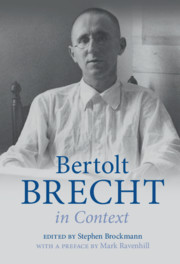Book contents
- Bertolt Brecht in Context
- Bertolt Brecht in Context
- Copyright page
- Contents
- Figure
- Notes on Contributors
- Chronology
- Abbreviations
- Preface
- A Note on Brecht in English
- Introduction
- Part I Brecht’s World
- Part II Brecht’s Work
- Chapter 13 The Work of the Theater
- Chapter 14 Brecht and Marxism
- Chapter 15 Brecht and Photography
- Chapter 16 Brecht and Film: Medium and Masses
- Chapter 17 Brecht and Fiction
- Chapter 18 Gestus in Context
- Chapter 19 Brecht’s Ethics
- Chapter 20 Brecht and Dialectics
- Chapter 21 Brecht and East Asia
- Chapter 22 Brecht’s Work with Musical Composers
- Part III The World’s Brecht
- Concise Bibliography
- Index
Chapter 19 - Brecht’s Ethics
from Part II - Brecht’s Work
Published online by Cambridge University Press: 28 May 2021
- Bertolt Brecht in Context
- Bertolt Brecht in Context
- Copyright page
- Contents
- Figure
- Notes on Contributors
- Chronology
- Abbreviations
- Preface
- A Note on Brecht in English
- Introduction
- Part I Brecht’s World
- Part II Brecht’s Work
- Chapter 13 The Work of the Theater
- Chapter 14 Brecht and Marxism
- Chapter 15 Brecht and Photography
- Chapter 16 Brecht and Film: Medium and Masses
- Chapter 17 Brecht and Fiction
- Chapter 18 Gestus in Context
- Chapter 19 Brecht’s Ethics
- Chapter 20 Brecht and Dialectics
- Chapter 21 Brecht and East Asia
- Chapter 22 Brecht’s Work with Musical Composers
- Part III The World’s Brecht
- Concise Bibliography
- Index
Summary
This article develops Brecht’s anti-metaphysical and materialist ethics through a close reading of “The Great Method,” a short text from his Me-ti that, in just three sentences, articulates a code of conduct for the revolutionary struggle. This article tries to show that even though “The Great Method” is based on the dialectics of Hegel, Marx, and Lenin, it also reflects Brecht’s interest in classical Chinese thought, in particular the Taoist notion of a subject’s full immersion in the situation requiring an ethical decision (Zhuangzi) and the assumption of an “efficacy that stems from disposition” (François Jullien), which, for example, underpins Brecht’s insistence on linguistic precision and use of modelbooks. This article also emphasizes the central role of production for Brecht’s ethics: “The Great Method” aims to unleash the human potential for productivity in all its forms, beyond capitalism, but is less interested in the production of things than in the production of change in things.
Keywords
- Type
- Chapter
- Information
- Bertolt Brecht in Context , pp. 166 - 173Publisher: Cambridge University PressPrint publication year: 2021

